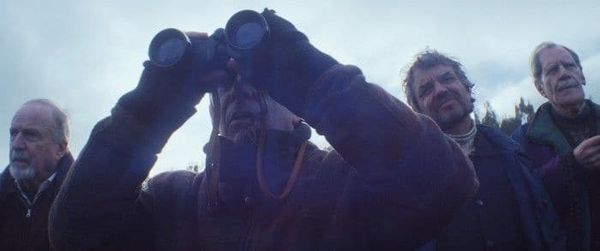Eye For Film >> Movies >> The Club (2015) Film Review
The Club
Reviewed by: Amber Wilkinson

Chilean director Pablo Larraín may have worked with a succession of different writers from his debut Fuga and his triptych of life under Augusto Pinochet Tony Manero, Post Mortem and No to this latest film, which is a strong contender in Berlin Film Festival's competition strand (in fact, it has gone on to win the Grand Jury Silver Bear) - but his themes of amorality, isolation, the avoidance of justice and obsession burn strongly throughout.
After taking on the corruption of the State, he - along with co-writers Guillermo Calderón and Daniel Villalobos - turn a gimlet gaze on the Catholic Church. The setting a sleepy coastal pueblo, where the most heady event for the locals is greyhound racing on a strip of land. Brindle greyhound Rayo is a strong competitor, so it seems strange that four of his five owners watch him from a small huddle up on a hill away from the spectators, especially when you consider that, as priests, they should surely be walking among the community.

They live under the watchful air of the fifth dog owner, Mother Mónica (Antonia Zegers) in a house that initially feels as though it could be the Chilean cousin of that inhabited by Father Ted and Mrs Doyle on Craggy Island. The humour here, however, is so ink black it stains what it touches. When a sixth priest, Father Lazcano (José Soza) arrives near the start of the film, he is given the lowdown on life in his new home, which involves considerable amounts of praying and limited, solitary time outside the house with little contact with locals.
He barely has time to rest his cassock, however, before an indication of why the priests are in the house is brought sharply into focus by an unexpected visitor. Sandokan (Robert Farías) is bearded, unkempt and rarely seen without a cheap carton of wine clutched in his hand like a talisman. He stands at the gate and begins to shout a lurid litany of the abuse he suffered at the hands of Lazcano. The sexual detail is so graphic it is almost absurd and yet there is nothing funny about this for the priests, who thanks to fresh scandal are about to be shaken out of their cosy isolation by the arrival of psychologist priest and investigator Father García (Marcelo Alonso) - who has every intention of making them confront the reasons why they have been sent there and quite possibly tossing them out with the bath water while he is at it.
The crimes of these fathers run long and deep, involving everything from (more) paedophilia to torture cover-up and black marketeering with babies, but perhaps the most absurd of all is the infirm, nappy-wearing Father Ramírez (Alejandro Sieveking), who appears to have entirely forgotten what transgression he is supposed to be repenting.
Father García may have come to scorch the earth but it is not long before he ends up singed by the flames of righteousness himself, as that age-old urge to protect the Church above all other considerations starts to raise its head. What marks Larrain's films out is his unpredictable plotlines and well-drawn characters, who only gradually reveal their facets. Here the intensely and increasingly inappropriate beneficent reaction of Mother Mónica to her "boys" is as disturbing as the inability of Father Vidal (Larrain regular Alfredo Castro) to fully acknowledge the depth of his crimes.
As the film progresses, obsessions bubble - from Father Vidal's intent focus on making his greyhound the fastest thing on four legs to Father García and Sandokan's desire to chase their own 'hares' no matter what the cost. That the victim would be, but for his vociferousness, the last of the Church's considerations is telling, with souls much less easily scrubbed clean than blood off a step. All the actors bring shifting emotions to their roles, vacillating between cock-sure, frightened and stubborn in the face of the truth, with Castro, in particular, proving that no matter how well known he becomes to Larraín fans, he can sink in to just about any role so deeply that you forget completely who he is.
The sins of these fathers are never visited by the sun, as the film is shot in deliberately dreary fashion by cinematographer Sergio Armstrong, with washed-out blues and shadowy figures giving the men's life an added smear of bleakness. Larraín's judgement when it comes is fiercely Old Testament - harsh, unexpected and fast. All lovers of good films should pray that this comes to a cinema near them soon.
Reviewed on: 11 Feb 2015

















